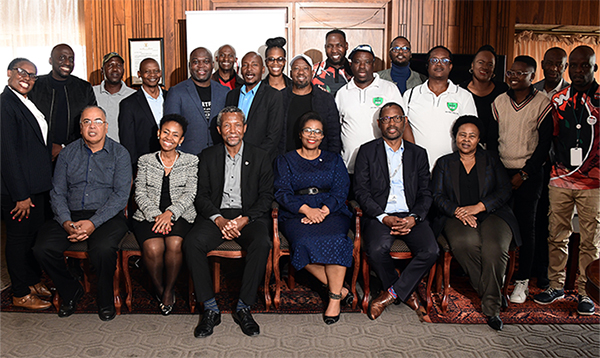News & Media
Unisa deepens anti-corruption partnership with Special Investigating Unit

Led by Principal and Vice-Chancellor, Prof Puleng LenkaBula (centre), the Unisa delegation comprised (from left) Dr Audrey Legodi, Chair of the Department of Auditing, Dr Moses Hlongoane, Executive Dean of the College of Accounting Sciences, Prof Solomon Magano, Vice-Principal: Institutional Development, and Prof Mpfariseni Budeli-Nemakonde, Executive Dean of the College of Law
On 17 July 2025, a high-level delegation from Unisa, led by Principal and Vice-Chancellor (VC), Prof Puleng LenkaBula, attended a prestigious graduation ceremony hosted by the Special Investigating Unit (SIU) at the Brigitte Mabandla Justice College. The event marked the successful completion of the Strategic Management Development Programme by 89 senior SIU managers, demonstrating the SIU’s commitment to professional development, ethical leadership and public service excellence.
In her keynote address, the VC commended the SIU for investing in its workforce's intellectual and strategic capacity, reinforcing that partnerships between academic institutions and the public sector are crucial in building a capable, ethical and development-oriented state. She further emphasised that the growing collaboration between Unisa and the SIU is rooted in a shared vision to strengthen institutional integrity, accountability and good governance.

The ceremony was graced by (from left) the Honourable Minister of Justice and Constitutional Development, Mmamoloko Kubayi, who delivered the main keynote address, and Advocate Andy Mothibi, Head of the SIU. Senior officials from other higher education institutions and state bodies were also in attendance, underscoring the collective national effort required to combat corruption.
Unisa’s presence at the event signified not only institutional support but also strategic alignment with national imperatives. This engagement builds on an ongoing collaboration between Unisa’s College of Accounting Sciences (CAS) and the SIU, particularly through the development of the Master’s Programme in Anti-Corruption housed within CAS. The programme, spearheaded by Dr Audrey Legodi, aims to professionalise and strengthen the capacity of law enforcement personnel across various public sector institutions. Its interdisciplinary design equips students with both theoretical insights and applied strategies to address systemic corruption and promote ethical governance.
This occasion represents more than just the conferring of certificates. It symbolises a deepening of ties between academia and public sector institutions in pursuit of a common goal: to eradicate corruption and build a more transparent, responsive and resilient state. As Unisa continues advancing engaged scholarship, the institution remains committed to working with strategic partners like the SIU to shape ethical leaders and promote accountability through education.
* Submitted by Dr Audrey Legodi, Chair of the Department of Auditing
Publish date: 2025/08/15

 Unisa co-hosts G20 community outreach in the Eastern Cape
Unisa co-hosts G20 community outreach in the Eastern Cape
 Unisans gain membership of prestigious science academies
Unisans gain membership of prestigious science academies
 Advocating for disability transformation through servant leadership
Advocating for disability transformation through servant leadership
 Unisa Press continues to illuminate the publishing space
Unisa Press continues to illuminate the publishing space